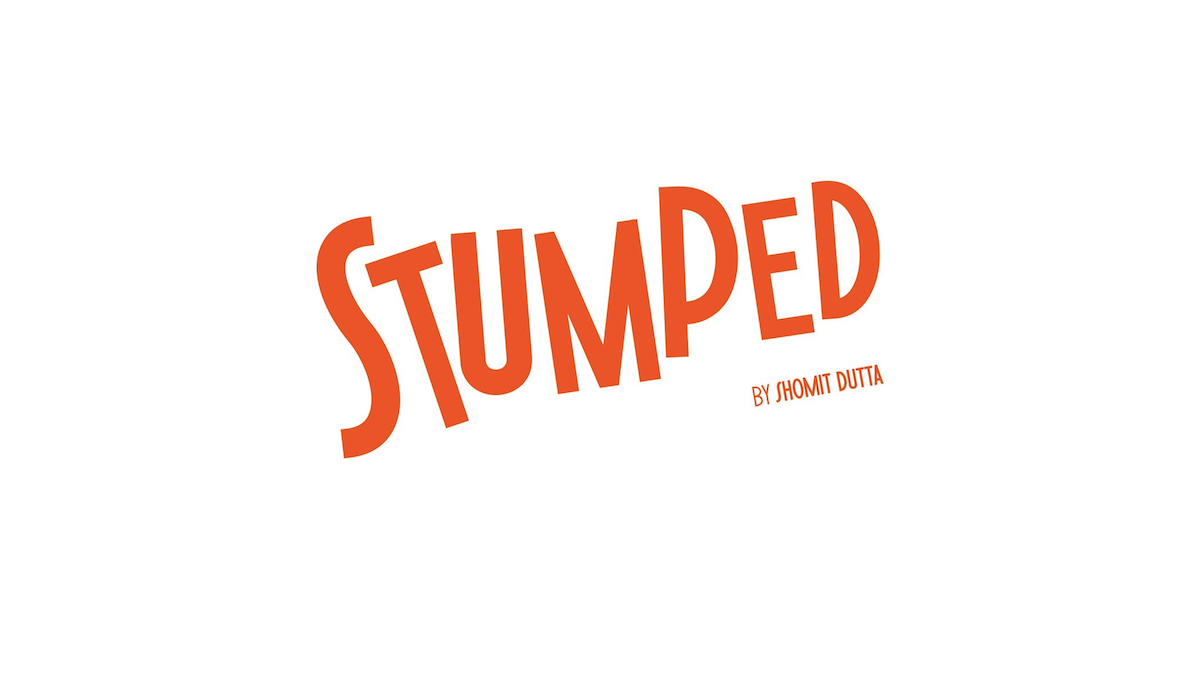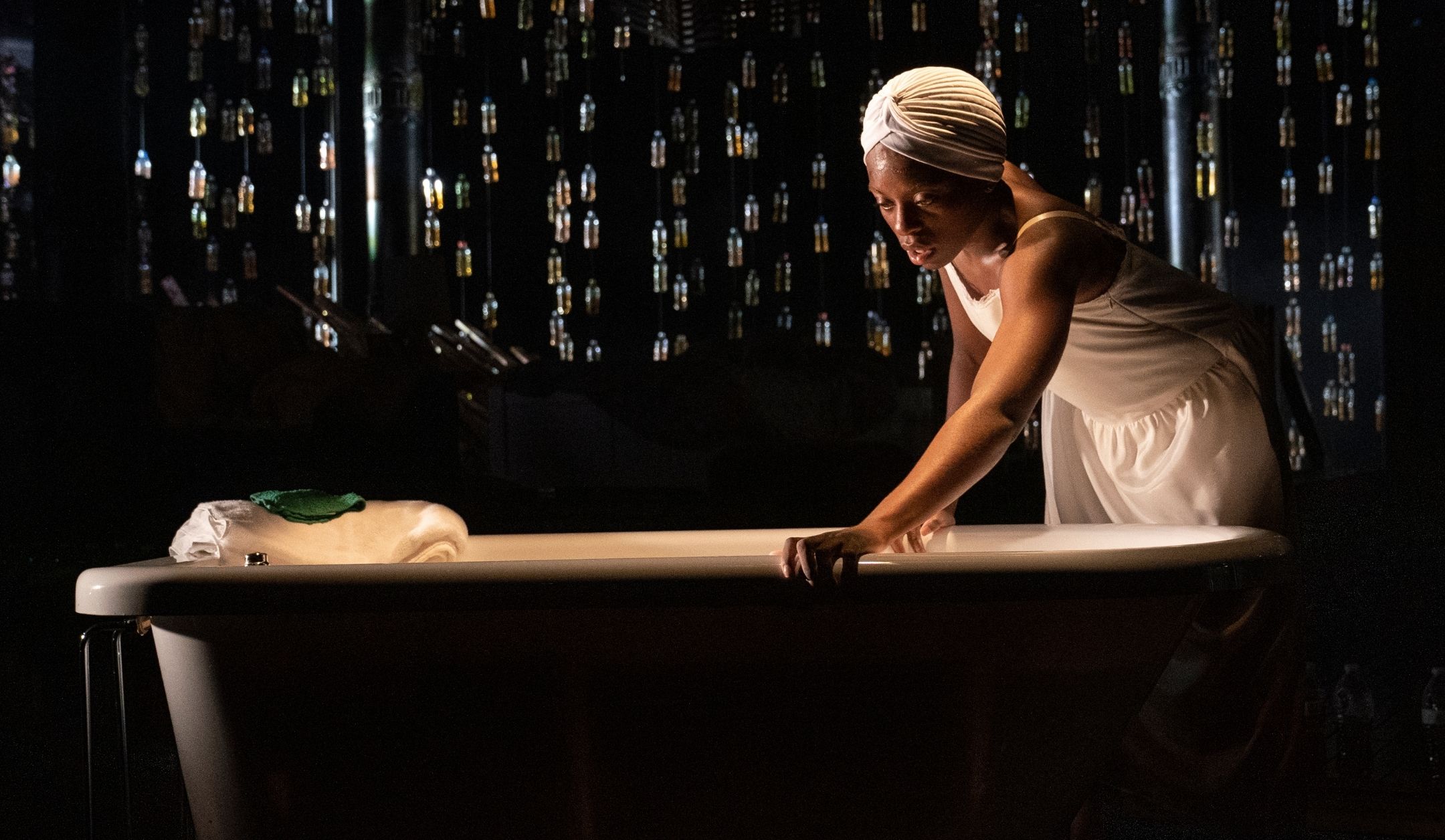
We chatted with playwright and avid cricket player Shomit Dutta—at the cricket match’s scoreboard—about his new play Stumped (UK), a shadowy caprice that turns the tables on two of the 20th century’s greatest playwrights, Samuel Beckett and Harold Pinter. Stumped subjects the writers to an unwelcome blend of their own worlds created by an unseen figure. Read on, and bring your cricket bat to dive into the discussion!
…
What inspired you to create this story of two great playwrights – Samuel Beckett and Harold Pinter – at a cricket match?
The idea of writing a play about these two emerged over time but there were also a couple of key moments. I had loved the work of Beckett (US/UK), prose and plays, from the sixth-form onwards; Pinter (US/UK) I encountered in my early twenties, and I read all his plays several times (they are very quick to read). Getting to know Harold through playing for Gaieties CC, I realised that the uncertainty and fierce contesting of territory in the world of his plays is very much a reflection of his own means of engagement with the world. I was far too young to have encountered Beckett in person, but I imagined that there might be a comparable correlation between his life and the more purgatorial worlds of his plays with their gallows humour.
My interest in writing something with writers as characters was partly influenced by what I read. I enjoyed, for instance, the unexpected appearance of James Joyce as a character working in a pub just outside Dublin in Flann O’Brien’s The Dalkey Archive. Likewise, I enjoyed Antony Burgess’ various fictional versions of Shakespeare in novels and short stories. I also spent a lot of time studying the ancient Greek comic playwright Aristophanes, who made his favourite playwrights characters in several of his plays. While I enjoyed critically analysing this kind of metafiction and metatheatre, the idea of writing a play of this kind with my own favourite playwrights was an alluring prospect. The lockdown of 2020 provided an ideal opportunity to do so while experiencing myself the conditions in which the characters both of Beckett’s and of Pinter’s plays often find themselves. This included feeling trapped whether indoors or out, feeling out of place and perhaps even out of one’s ground—as a batsman is when run out or stumped.
What kind of research did you do for writing the play?
I didn’t do much ‘research’ as such. I did reread all of Beckett’s and Pinter’s plays so as to reanimate them in my mind or subconscious, and to think about in the context of reanimating them as characters. I had a pretty good sense of Harold’s voice and his particular way of speaking from knowing him for nearly ten years. With Beckett, there are almost no recordings of how he sounded, so I read some of his letters (four wonderful, weighty volumes of these have been published by Faber) (UK) and some of his prose writing (particularly Murphy, Watt and First Love and the other short stories usually grouped with it). With Pinter I also watched a couple of video clips and TV programs of Harold talking variously about his plays, about cricket and about Beckett. I also took a close look at his two monographs on Arthur Wellard, the Somerset and England cricketer who played for Gaieties with Harold, and on Anew McMaster (‘Mac’), the actor manager with whom Harold toured Ireland as a callow young actor.
Stumped feels like a love letter to cricket. How did you combine your interests in cricket and theatre as you created this work?
I’m not sure that the play is a love letter to cricket—the play focusses more on its routines, superstitions and cruel disappointments—but it certainly has cricket in its fibres. The first act starts with Pinter, as the player in next but one, padding up, and it ends with Beckett, the next man in, going in to bat. The second act contains a drunken but sobering review of the game and involves the characters trying to get home after the game. So the action is built around going to play a game of cricket as part of a wandering side (i.e., one with no home ground). A batsman is stumped when they are unable to make it back to their own ground—‘home’ as it were. So the play, in which Beckett and Pinter are trying to make their way back home, involves metaphorical stumping, or danger of being stumped. But the play isn’t about cricket. Cricket forms a backdrop or context that informs the action. The rhythms of cricket are present throughout. As Mike Brearley eloquently puts in his book On Cricket, these rhythms chime with the rhythms of life: the fielders’ regular walking in and walking out as bowlers bowl and walk back to their marks, for example, Brearley sees as resembling both breathing and sex. Pinter, of course, also famously likened cricket to sex.
As for cricket and theatre, I didn’t have to connect them. I’ve been playing for twenty-something years for a cricket team of which about half are in some way connected to theatre or the arts. I’ve always felt that both cricket and drama involve a distinctive metaphoric relationship to life. Actors have their exits and their entrances. An innings is like a life or part in a play. Its end is certainly like a death. In the play my two main acts are like two innings. The three calls someone batting can make—yes, no and wait—permeate the play’s dialogue and action. So for me, cricket and theatre are ready bedfellows and it was natural to interweave them.
The play is filled with Easter eggs of references different stage works by Beckett, Pinter and other writers. How did you decide which works or lines to include?
This is a question to which I have devoted far too much thought. I spent a lot of time, as part of a DPhil on the playwright Aristophanes, trying to figure out how, when and why he peppered his plays with quotation from and references to the three tragedians Aeschylus, Sophocles and Euripides and their plays. What writing this play helped me realise was that it wasn’t a case of consciously or deliberately larding one’s work with references, but rather writing the play and allowing such reference to emerge as and when it did. The process is largely a subconscious one. I’ve written hundreds of pages on this subject, perhaps needlessly, as I think a paragraph just about covers it.
What do you want audiences to take away from the show?
The play has no message. It is not a lecture. To my mind good plays don’t, or shouldn’t, have a message to impart to their audiences. Rather they should invite audiences to reflect for themselves. The play is what it is, an enactment. It presents characters in a situation and hopefully is well enough put together to work as piece of drama. What audiences take away from a play is their own business.
Apart from Beckett and Pinter, are there any particular playwrights or theatre makers who have inspired your writing and the kind of work that you want to make?
I’ve just written a play about a real-life encounter between Oscar Wilde and Walt Whitman. I very much like both their work but the impulse to write a play with them as characters was more to do with the potential of the encounter; no one really knows what happened. Wilde was a playwright (among other things) but Whitman was not. It is not quite clear what Wilde was in 1881, when the play is set. I suppose I am interested in artists more generally than playwrights per se. I am also in the early stages of writing a play about an artist, Artemisia Gentileschi. The interest here is her turbulent life as much as her art. I also see a connection between the baroque artists’ interest in the visceral and preoccupation with light and dark (chiaroscuro) and the shadowy, gruesome, macabre quality of Jacobean drama.
Finally, could you tell us your favourite works by Beckett and Pinter?
My favourite play by Beckett is perhaps Krapp’s Last Tape (US/UK), though of course I love Endgame (US/UK) and Waiting for Godot (US/UK). Many of my favourite works of Beckett’s are actually prose works, above all Murphy and the short stories The Expelled, The Calmative, The End and First Love. It is very difficult to say what my favourite Pinter play is. If I were forced to choose, in a Desert-Island-Discs sort of way, I’d probably say The Birthday Party (US/UK), The Homecoming (US/UK) and No Man’s Land (US/UK) (though, of the shorter or less well-known plays, also I love The Hothouse (UK), A Slight Ache (UK) and Victoria Station (UK)). Of these three great works, No Man’s Land is perhaps my favourite, which is fitting given that its four characters—Spooner, Hirst, Briggs and Foster—are all named after cricketers from the game’s golden age. It is not only, for my money, Pinter’s best and most complete play, but also the play most evidently informed by cricket.
…
Buy the script of Stumped on Concord Theatricals UK website. Why not discover the works by Samuel Beckett (US/UK) and Harold Pinter (US/UK)?
Header image: Artwork by Rebecca Pit

Real Pleasures to Perform: Plays Inspired by True Events

Newly Available for Licensing – November 2025 (US)

